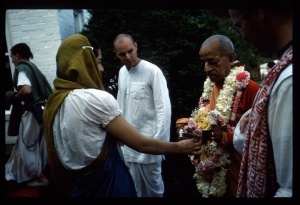CC Antya 9.141 (1975): Difference between revisions
(Vanibot #0027: CCMirror - Mirror CC's 1996 edition to form a basis for 1975) |
(Vanibot #0020: VersionCompareLinker - added a link to the Version Compare feature) |
||
| Line 2: | Line 2: | ||
<div style="float:left">'''[[Sri Caitanya-caritamrta (1975)|Śrī Caitanya-caritāmṛta (1975)]] - [[CC Antya (1975)|Antya-līlā]] - [[CC Antya 9 (1975)|Chapter 9: The Deliverance of Gopīnātha Paṭṭanāyaka]]'''</div> | <div style="float:left">'''[[Sri Caitanya-caritamrta (1975)|Śrī Caitanya-caritāmṛta (1975)]] - [[CC Antya (1975)|Antya-līlā]] - [[CC Antya 9 (1975)|Chapter 9: The Deliverance of Gopīnātha Paṭṭanāyaka]]'''</div> | ||
<div style="float:right">[[File:Go-previous.png|link=CC Antya 9.140 (1975)|Antya-līlā 9.140]] '''[[CC Antya 9.140 (1975)|Antya-līlā 9.140]] - [[CC Antya 9.142 (1975)|Antya-līlā 9.142]]''' [[File:Go-next.png|link=CC Antya 9.142 (1975)|Antya-līlā 9.142]]</div> | <div style="float:right">[[File:Go-previous.png|link=CC Antya 9.140 (1975)|Antya-līlā 9.140]] '''[[CC Antya 9.140 (1975)|Antya-līlā 9.140]] - [[CC Antya 9.142 (1975)|Antya-līlā 9.142]]''' [[File:Go-next.png|link=CC Antya 9.142 (1975)|Antya-līlā 9.142]]</div> | ||
{{CompareVersions|CC|Antya 9.141|CC 1975|CC 1996}} | |||
{{RandomImage}} | {{RandomImage}} | ||
==== TEXT 141 ==== | ==== TEXT 141 ==== | ||
| Line 11: | Line 10: | ||
<div class="verse"> | <div class="verse"> | ||
:mahā-viṣaya kara, kibā virakta udāsa | :mahā-viṣaya kara, kibā virakta udāsa | ||
:janme-janme tumi | :janme-janme tumi pañca--mora 'nija-dāsa' | ||
</div> | </div> | ||
| Line 25: | Line 24: | ||
<div class="translation"> | <div class="translation"> | ||
"Whether you are involved in material activities or become completely renounced, you five brothers are all My eternal servants, birth after birth. | |||
</div> | </div> | ||
| Line 32: | Line 31: | ||
<div class="purport"> | <div class="purport"> | ||
Śrīla Bhaktisiddhānta Sarasvatī Ṭhākura comments that one should | Śrīla Bhaktisiddhānta Sarasvatī Ṭhākura comments that one should remember that he is eternally a servant of Kṛṣṇa. Whether one is engaged in material activity involving pounds, shillings and pence or is in the renounced order, he should always think that he is an eternal servant of God, for that is the real position of the living being. Taking sannyāsa and dealing in pounds, shillings and pence are both external affairs. One should always consider how to please and satisfy Kṛṣṇa. Thus even if one is involved in great material affairs, he will not become attached. As soon as one forgets that he is an eternal servant of Kṛṣṇa, he becomes involved in material attachments. However, if one is always conscious that Kṛṣṇa is always the supreme master and that he is an eternal servant of Kṛṣṇa, he is a liberated person in any condition. Entangling material activities will not affect him. | ||
</div> | </div> | ||
Latest revision as of 04:33, 27 January 2020

A.C. Bhaktivedanta Swami Prabhupada
TEXT 141
- mahā-viṣaya kara, kibā virakta udāsa
- janme-janme tumi pañca--mora 'nija-dāsa'
SYNONYMS
mahā-viṣaya—great material engagements; kara—you perform; kibā—or; virakta—renounced; udāsa—free from attachment; janme-janme—birth after birth; tumi pañca—you five; mora—My; nija-dāsa—own servants.
TRANSLATION
"Whether you are involved in material activities or become completely renounced, you five brothers are all My eternal servants, birth after birth.
PURPORT
Śrīla Bhaktisiddhānta Sarasvatī Ṭhākura comments that one should remember that he is eternally a servant of Kṛṣṇa. Whether one is engaged in material activity involving pounds, shillings and pence or is in the renounced order, he should always think that he is an eternal servant of God, for that is the real position of the living being. Taking sannyāsa and dealing in pounds, shillings and pence are both external affairs. One should always consider how to please and satisfy Kṛṣṇa. Thus even if one is involved in great material affairs, he will not become attached. As soon as one forgets that he is an eternal servant of Kṛṣṇa, he becomes involved in material attachments. However, if one is always conscious that Kṛṣṇa is always the supreme master and that he is an eternal servant of Kṛṣṇa, he is a liberated person in any condition. Entangling material activities will not affect him.